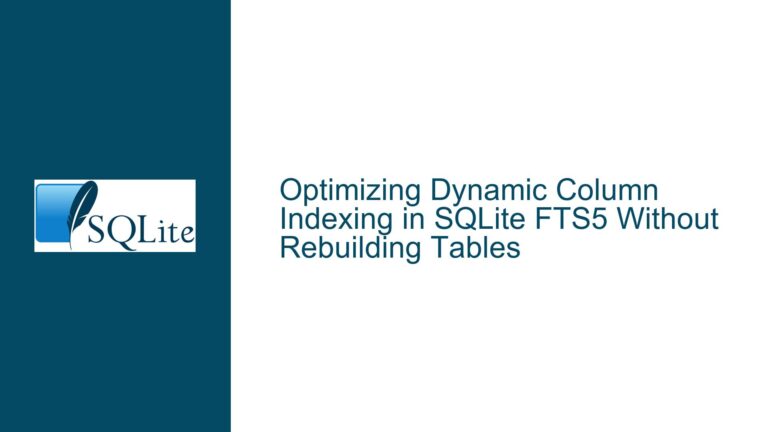Variadic Arguments in SQLite JSON Functions
Rationale Behind Variadic Arguments in JSON Functions
The use of variadic arguments in SQLite’s JSON functions, such as json_object, is a design choice that reflects both the limitations and the flexibility required when working with JSON data in a relational database context. Variadic functions are those that accept a variable number of arguments, and in the case of SQLite’s JSON functions, this design allows for a more explicit and flexible way to construct JSON objects.
When you use json_object('id', id, 'name', name), you are explicitly pairing each value with a key. This explicit pairing is necessary because SQLite’s JSON functions do not have access to the column names or aliases used in the SELECT statement. The function only receives the values, not the metadata about those values, such as their column names. This is a fundamental limitation of how SQLite handles function arguments, particularly for application-defined functions.
In contrast, a SELECT statement like select id, name inherently knows the column names because it is part of the SQL language’s syntax and semantics. The SQL engine has access to the schema information, which includes column names and aliases. However, when you pass these values to a function, that metadata is not automatically passed along. This is why you cannot simply write json_object(id, name) and expect SQLite to infer the keys from the column names.
Limitations of Column Name Access in Function Arguments
The inability of SQLite’s JSON functions to access column names or aliases directly from the SELECT statement is rooted in the way SQLite’s C API handles function arguments. When you define a function in SQLite, whether it’s a built-in function or an extension, the function only receives the values of the arguments, not their names or any other metadata. This is true even for functions that are part of the SQLite core, such as the JSON functions.
This limitation is not unique to SQLite. Other databases, such as PostgreSQL, also handle JSON functions in a similar manner. In PostgreSQL, for example, you would also need to explicitly specify the keys and values when constructing a JSON object. This is because the underlying mechanism for handling function arguments is similar across different database systems. The function only receives the values, and any additional metadata, such as column names, must be provided explicitly.
The distinction between the SELECT statement and function arguments becomes even more apparent when you consider more complex expressions. For example, if you want to include a calculated value in your JSON object, such as count(distinct cultivar), you cannot rely on column names or aliases to provide the keys. Instead, you must explicitly specify both the key and the value, as in json_object('count(distinct cultivar)', count(distinct cultivar)). This explicit specification ensures that the resulting JSON object is correctly structured, regardless of the complexity of the expressions used to generate the values.
Flexibility and Complexity in JSON Key-Value Pairing
The use of variadic arguments in SQLite’s JSON functions also provides a level of flexibility that would be difficult to achieve with a more rigid argument structure. By allowing any number of key-value pairs to be passed to the function, SQLite enables developers to construct JSON objects that can vary in structure and complexity. This flexibility is particularly useful when dealing with dynamic data, where the structure of the JSON object may not be known in advance.
For example, consider a scenario where you need to construct a JSON object that includes a key whose name is derived from the content of a column. In this case, you would need to dynamically generate both the key and the value. With variadic arguments, you can achieve this by including the column content as part of the key-value pair, as in json_object(column_name || '_key', column_value). This would be much more difficult, if not impossible, if the function did not support variadic arguments.
Moreover, the use of variadic arguments allows for the construction of JSON objects that include nested structures. For example, you can create a JSON object that includes another JSON object as one of its values by nesting calls to json_object, as in json_object('outer_key', json_object('inner_key', inner_value)). This level of nesting would be cumbersome to achieve with a fixed argument structure, as it would require multiple function calls and intermediate results.
In summary, the use of variadic arguments in SQLite’s JSON functions is a deliberate design choice that addresses both the limitations of function argument handling and the need for flexibility in constructing JSON objects. By requiring explicit key-value pairing, SQLite ensures that the resulting JSON objects are correctly structured, regardless of the complexity of the data or the expressions used to generate it. This approach, while perhaps less convenient in some cases, provides a robust and flexible mechanism for working with JSON data in a relational database context.
Troubleshooting Steps, Solutions & Fixes
When working with SQLite’s JSON functions, it’s important to understand the limitations and design choices that underlie their behavior. If you encounter issues or confusion related to the use of variadic arguments in these functions, the following steps can help you troubleshoot and resolve the problem.
First, ensure that you are explicitly specifying both the keys and values when constructing JSON objects. This is necessary because SQLite’s JSON functions do not have access to column names or aliases. If you attempt to use a shorthand syntax, such as json_object(id, name), you will encounter errors or unexpected results. Instead, always use the full key-value pairing syntax, as in json_object('id', id, 'name', name).
Second, if you need to include complex expressions or calculated values in your JSON objects, make sure to explicitly specify both the key and the value. For example, if you want to include a count of distinct values in your JSON object, you should write json_object('count(distinct cultivar)', count(distinct cultivar)). This ensures that the resulting JSON object is correctly structured and that the key accurately reflects the content of the value.
Third, if you need to dynamically generate keys based on column content or other variables, use string concatenation or other string manipulation techniques to construct the key-value pairs. For example, you can use json_object(column_name || '_key', column_value) to create a key that includes the content of a column. This approach allows you to generate keys that are not fixed literals, providing greater flexibility in constructing JSON objects.
Finally, if you encounter performance issues or other challenges when working with JSON functions, consider optimizing your queries or schema design. For example, you may be able to reduce the complexity of your JSON objects by breaking them into smaller, more manageable pieces. Alternatively, you may be able to improve performance by indexing the columns used in your JSON functions or by using more efficient query patterns.
In conclusion, while the use of variadic arguments in SQLite’s JSON functions may require a more explicit and verbose syntax, it provides a robust and flexible mechanism for constructing JSON objects. By understanding the limitations and design choices behind these functions, you can effectively troubleshoot and resolve any issues that arise, ensuring that your JSON data is correctly structured and efficiently managed.






